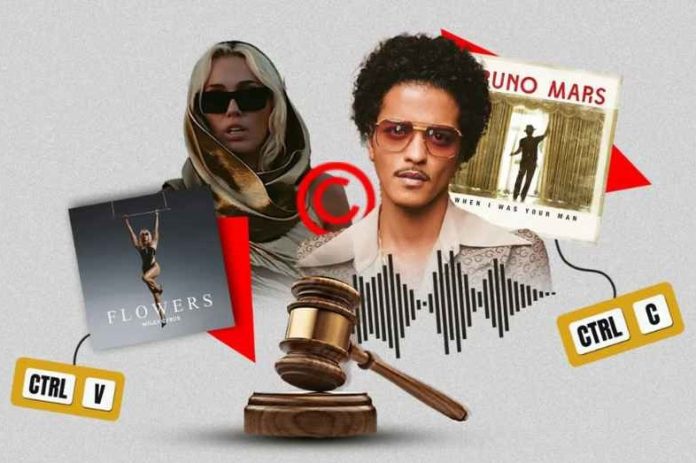
Miley Cyrus’ hit song Flowers dominated global charts in 2023, but it now finds itself at the heart of a copyright lawsuit. The lawsuit alleges that Cyrus’ track borrows from a previously released song, raising essential questions about artistic freedom and copyright law. As the music industry navigates through legal battles over creativity, the outcome of this case could set new precedents.
The Lawsuit: Allegations of Copyright Infringement
The plaintiffs argue that Flowers unlawfully mimics key elements of their original song, including melody, lyrical structure, or rhythm. They seek compensation, accusing Cyrus of infringement. Copyright lawsuits in music often hinge on whether “substantial similarity” exists between the original work and the alleged copy.
The case stirs a broader conversation on copyright infringement in an industry where artists frequently blend genres, sample music, and pay homage to past hits. Although the lawsuit is ongoing, it could establish a new precedent, particularly as modern music constantly reinterprets previous influences.
Legal Precedents in Music
This case echoes earlier high-profile copyright lawsuits, such as the 2015 Blurred Lines case involving Robin Thicke and Pharrell Williams. They were ordered to pay $5 million to Marvin Gaye’s estate for copying elements of Got to Give It Up. That decision opened the floodgates for copyright claims, causing many artists to fear legal repercussions for even perceived similarities.
Other similar cases, like Ed Sheeran’s Shape of You and Katy Perry’s Dark Horse, show that copyright law continues to stretch its limits. While these cases often aim to protect original creators, they also raise concerns about stifling creativity in a field where musical influences frequently overlap.
Copyright Law: A Double-Edged Sword
Copyright laws are designed to protect original works and ensure creators receive due compensation. However, in the world of music, the limited number of chord progressions and melodies can blur the line between inspiration and plagiarism. Many songs share similar structures, particularly within the same genre, which can lead to copyright disputes even when the similarity is coincidental.
If Miley Cyrus loses the case, it could set stricter boundaries for future artists, making them more cautious in their creative endeavors. Artists may start avoiding musical experimentation, fearing potential legal repercussions.
Industry Reactions and Artistic Freedom
While some view these lawsuits as essential protections, others argue they restrict artistic freedom. Critics claim that all creative work draws from the past in some way, and over-enforcement of copyright laws could limit innovation. Artists might begin consulting legal teams more rigorously during the creative process or securing licensing agreements when drawing inspiration from existing works.
If the court rules against Cyrus, artists could become more wary of releasing songs that resemble older tracks. Conversely, if Cyrus wins, it could embolden musicians to continue experimenting with sounds without fear of litigation.
Impact on Streaming and Revenue
This lawsuit may also affect streaming platforms. If Flowers is removed from services like Spotify and Apple Music, it could lead to substantial financial losses for Cyrus, her label, and the streaming platforms. As streaming royalties form a significant part of an artist’s income, disruptions from copyright disputes could have far-reaching implications.
A negative ruling may push labels to develop clearer music licensing guidelines. Streaming platforms might need to evolve their agreements with artists to provide stronger protections against infringement claims, especially as genre-blending music gains popularity.
The Role of Labels and Management
Record labels play a critical role in copyright disputes. Columbia Records, Cyrus’ label, has a legal team ready to mitigate risks and often pushes for settlements before cases go to trial. In this instance, behind-the-scenes negotiations may seek to protect Flowers’ commercial viability while addressing the plaintiffs’ concerns.
As copyright lawsuits increase, labels may start using advanced technologies to screen new tracks for similarities to existing works, ensuring compliance with copyright laws before release.
Cultural Commentary: Innovation vs. Commercialization
The Flowers lawsuit embodies the tension between artistic freedom and music commercialization. While copyright laws protect intellectual property, they can also stifle creativity. Some artists may feel restricted in experimenting with sounds, fearing infringement claims. On the other hand, supporters of strong copyright laws argue that they preserve artists’ legacies and protect against unauthorized use.
This debate will remain central to discussions about artistic expression as the music industry continues to evolve.
The Future of Copyright and Music Creation
The outcome of the Flowers lawsuit will have a lasting impact on the music industry. A ruling in favor of the plaintiff could lead to an increase in copyright claims, while a victory for Cyrus might embolden artists to push boundaries without legal fear.
Music Industry Weekly understands that the case highlights the need for clearer guidelines regarding musical inspiration and sampling in the digital era. Whether the court strengthens copyright protections or moves towards leniency, the decision will shape how artists, labels, and the courts navigate intellectual property in the future.
As Miley Cyrus’ Flowers faces legal scrutiny, this case will likely set an important precedent for music copyright law. Whether the court sides with the plaintiff or Cyrus, the ruling will affect how the industry balances intellectual property rights and artistic freedom.